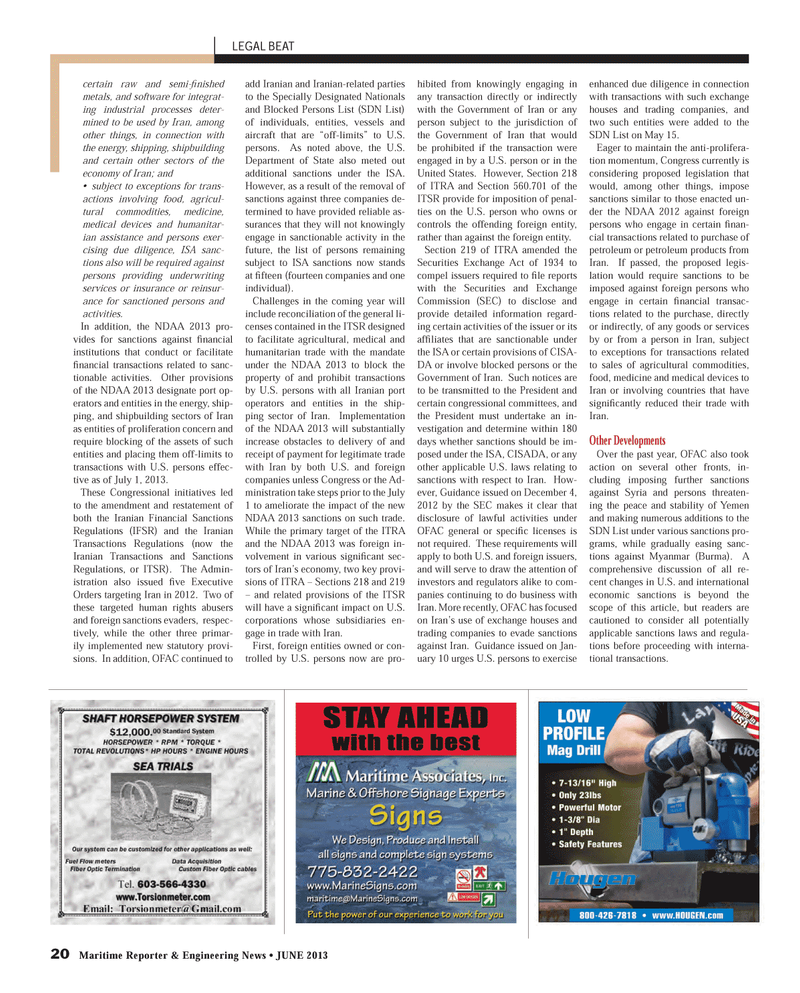
Page 20: of Maritime Reporter Magazine (June 2013)
Annual World Yearbook
Read this page in Pdf, Flash or Html5 edition of June 2013 Maritime Reporter Magazine
20 Maritime Reporter & Engineering News ? JUNE 2013 certain raw and semi-Þ nished metals, and software for integrat- ing industrial processes deter- mined to be used by Iran, among other things, in connection with the energy, shipping, shipbuilding and certain other sectors of the economy of Iran; and? subject to exceptions for trans- actions involving food, agricul-tural commodities, medicine, medical devices and humanitar- ian assistance and persons exer- cising due diligence, ISA sanc- tions also will be required against persons providing underwriting services or insurance or reinsur- ance for sanctioned persons and activities.In addition, the NDAA 2013 pro- vides for sanctions against Þ nancial institutions that conduct or facilitate Þ nancial transactions related to sanc- tionable activities. Other provisions of the NDAA 2013 designate port op- erators and entities in the energy, ship- ping, and shipbuilding sectors of Iran as entities of proliferation concern and require blocking of the assets of such entities and placing them off-limits to transactions with U.S. persons effec- tive as of July 1, 2013.These Congressional initiatives led to the amendment and restatement of both the Iranian Financial Sanctions Regulations (IFSR) and the Iranian Transactions Regulations (now the Iranian Transactions and Sanctions Regulations, or ITSR). The Admin- istration also issued Þ ve Executive Orders targeting Iran in 2012. Two of these targeted human rights abusers and foreign sanctions evaders, respec-tively, while the other three primar- ily implemented new statutory provi-sions. In addition, OFAC continued to add Iranian and Iranian-related parties to the Specially Designated Nationals and Blocked Persons List (SDN List) of individuals, entities, vessels and aircraft that are ?off-limits? to U.S. persons. As noted above, the U.S. Department of State also meted out additional sanctions under the ISA. However, as a result of the removal of sanctions against three companies de-termined to have provided reliable as-surances that they will not knowingly engage in sanctionable activity in the future, the list of persons remaining subject to ISA sanctions now stands at Þ fteen (fourteen companies and one individual).Challenges in the coming year will include reconciliation of the general li-censes contained in the ITSR designed to facilitate agricultural, medical and humanitarian trade with the mandate under the NDAA 2013 to block the property of and prohibit transactions by U.S. persons with all Iranian port operators and entities in the ship-ping sector of Iran. Implementation of the NDAA 2013 will substantially increase obstacles to delivery of and receipt of payment for legitimate trade with Iran by both U.S. and foreign companies unless Congress or the Ad- ministration take steps prior to the July 1 to ameliorate the impact of the new NDAA 2013 sanctions on such trade. While the primary target of the ITRA and the NDAA 2013 was foreign in- volvement in various signiÞ cant sec- tors of Iran?s economy, two key provi- sions of ITRA ? Sections 218 and 219 ? and related provisions of the ITSR will have a signiÞ cant impact on U.S. corporations whose subsidiaries en-gage in trade with Iran.First, foreign entities owned or con-trolled by U.S. persons now are pro-hibited from knowingly engaging in any transaction directly or indirectly with the Government of Iran or any person subject to the jurisdiction of the Government of Iran that would be prohibited if the transaction were engaged in by a U.S. person or in the United States. However, Section 218 of ITRA and Section 560.701 of the ITSR provide for imposition of penal-ties on the U.S. person who owns or controls the offending foreign entity, rather than against the foreign entity. Section 219 of ITRA amended the Securities Exchange Act of 1934 to compel issuers required to Þ le reports with the Securities and Exchange Commission (SEC) to disclose and provide detailed information regard-ing certain activities of the issuer or its afÞ liates that are sanctionable under the ISA or certain provisions of CISA- DA or involve blocked persons or the Government of Iran. Such notices are to be transmitted to the President and certain congressional committees, and the President must undertake an in-vestigation and determine within 180 days whether sanctions should be im-posed under the ISA, CISADA, or any other applicable U.S. laws relating to sanctions with respect to Iran. How-ever, Guidance issued on December 4, 2012 by the SEC makes it clear that disclosure of lawful activities under OFAC general or speci Þ c licenses is not required. These requirements will apply to both U.S. and foreign issuers, and will serve to draw the attention of investors and regulators alike to com-panies continuing to do business with Iran. More recently, OFAC has focused on Iran?s use of exchange houses and trading companies to evade sanctions against Iran. Guidance issued on Jan-uary 10 urges U.S. persons to exercise enhanced due diligence in connection with transactions with such exchange houses and trading companies, and two such entities were added to the SDN List on May 15.Eager to maintain the anti-prolifera-tion momentum, Congress currently is considering proposed legislation that would, among other things, impose sanctions similar to those enacted un-der the NDAA 2012 against foreign persons who engage in certain Þ nan-cial transactions related to purchase of petroleum or petroleum products from Iran. If passed, the proposed legis-lation would require sanctions to be imposed against foreign persons who engage in certain Þ nancial transac- tions related to the purchase, directly or indirectly, of any goods or services by or from a person in Iran, subject to exceptions for transactions related to sales of agricultural commodities, food, medicine and medical devices to Iran or involving countries that have signiÞ cantly reduced their trade with Iran. Other Developments Over the past year, OFAC also took action on several other fronts, in-cluding imposing further sanctions against Syria and persons threaten-ing the peace and stability of Yemen and making numerous additions to the SDN List under various sanctions pro-grams, while gradually easing sanc-tions against Myanmar (Burma). A comprehensive discussion of all re-cent changes in U.S. and international economic sanctions is beyond the scope of this article, but readers are cautioned to consider all potentially applicable sanctions laws and regula-tions before proceeding with interna-tional transactions. LEGAL BEAT MR #6 (18-25).indd 20MR #6 (18-25).indd 205/30/2013 12:07:55 PM5/30/2013 12:07:55 PM

 19
19

 21
21
